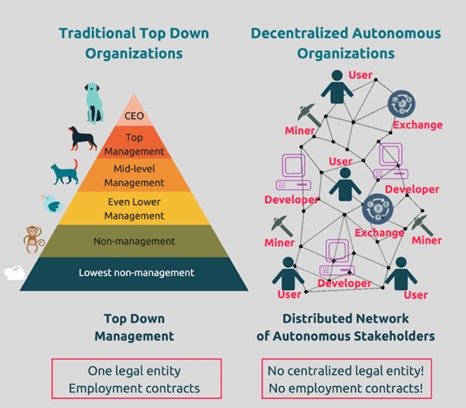DAO
INTRODUCTION
‘Decentralised Autonomous Organisations’ (DAOs) are an emergent institutional form made possible by blockchain technology. They allow startups to build unique cooperative architectures and customised incentive mechanisms around shared crypto wallets. This is in sharp contrast with the traditional ‘company’ as well as its operational division between ‘shareholders’ and ‘managers’. Members of a DAO can set up agile structures focused on specific tasks in which decisions are taken through community votes.
There are many different kinds of DAOs in existence – ranging from Defi protocols to social platforms and media ventures. There is a huge degree of variation in their management structures, functions and decision-making processes. Many DAOs chose to begin with loose architectural frameworks and evolved community governance mechanisms as they grew. Others, such as the Ethereum Name Service, started with short written ‘constitutions’ with binding rules for all members.

TECHNOLOGICAL OVERVIEW
Technologically speaking, DAOs are fairly straightforward. At their core exist one or more crypto wallets which are jointly managed by its members. Their flows and permissions, i.e. the organisations’ hard ‘rules’ are usually written into smart contracts. Participation in a DAO can take a number of forms, but the most popular method is the use of native tokens which can be used to allocate voting and/or ideation rights.
Any standard firm or company can be reimagined as a DAO. For instance, one could think of a law firm providing cross-border consultations. Its different members (associates, partners, interns etc.) may be integrated at different functional levels and get access to documents, materials, funds etc. based on the coded requirements. Once the work is shared and approved by the client, smart contract triggers may be used to share fees in a specific distribution with the members.
As institutional theory makes clear, however, firms also require many informal rules which cannot be automated. This is why many DAOs rely on a tailored mix of hybrid contracts, with standard written agreements covering those aspects which cannot be coded. Governance related innovations around DAOs have drawn a lot of attention in the recent past, and a lot of interesting research continues to be done in this area. Native tokens have been deployed in creative ways to incentivise members to ideate and develop together. It is safe to say, however, that designing a successful DAO will remain more art than science since purposeful human cooperation can never be entirely left to algorithms.
LEGAL IMPLICATIONS
DAOs have evolved into an entirely novel class of organisations, but the law is yet to catch up with this reality. A majority of them are unregistered and therefore have an uncertain legal status. This uncertainty is likely to impede their growth and development, especially in light of traditional tax and auditing requirements. For the same reason, DAOs cannot presently claim any legal privileges (such as limited liability) available to registered corporations.
If a DAO is not run by an incorporated concern, it is likely to be treated as an unincorporated partnership. In such partnerships, each individual has unlimited liability. Therefore, if a DAO is hacked or declares bankruptcy, each member is exposed to liability for the whole loss. If a lawsuit follows and the plaintiff is unable to recover fully from the “DAO partnership,” he may turn to the personal assets of each DAO member until their claim is satisfied. Certain states (such as Wyoming) have taken proactive legislative steps in this regard but the extent to which DAOs can be absorbed within the principles of corporate law remains to be seen. A key area of contention in this regard is whether a DAOs native token constitutes a ‘security’. In United States law, the Howey Test provides this standard, but it is not clear whether fully decentralised organisations fall within its ambit.
Another pertinent issue here is AML/KYC compliance. Since DAO members are just crypto wallet holders, individuals often remain pseudonymous. As a result, compliance with AML/KYC policies becomes difficult if not impossible. This explains why most DAOs choose to start off as small communities of known members. As this organisational form grows and members from many different jurisdictions begin participating, however, it is clear that one will require common international standards for DAO governance and regulation. What is more, since they remain, by and large, unregulated legal entities – no legal guarantee associated with traditional businesses (such as property rights, contract breaches, investor protection etc.) is offered upon membership. A viable method of bypassing this bottleneck may be to route the DAOs traditional business functions through a recognised legal form – such as a registered company in a particular jurisdiction. The precise manner and architecture of this integration will, however, depend on the specific purposes of the DAO.
Having said that, there are many grey areas in which it is not possible to determine whether an NFT holder is the actual owner of an underlying asset. Instances of copyright and trademark infringement, for instance, are quite widespread in the cryptoverse. Oftentimes when an NFT project is successful, many iterations of it may be released such that they become barely distinguishable from each other. The copyright issues such projects raise need to be analysed on a case to case basis, and in light of evolving precedent. If any commercial use-rights flow from the NFT project (for instance the right to specific merchandise or access to events) then they must be carefully drafted before being promised to the NFT holder. Presently, in our view, most NFT projects do not take these challenges seriously, and therefore carry the risk of serious legal conflicts in the future.
